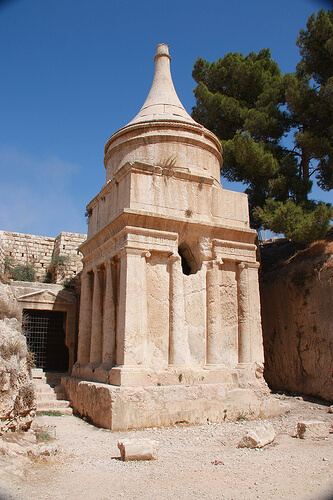
II Samuel 18:18
Deep down inside, all of us want to be remembered. We want to leave our mark on the world. Even if we do not achieve fame or stardom, we want to believe that we have done something that will last and endure. We dare hope to believe that our name will live on. Absalom certainly did.
If you get on a plane and travel to Israel, you can go to Jerusalem and see Yad Abshalom or Absalom’s Monument. It stands on the eastern side of Jerusalem, on the eastern slope of the Kidron Valley, at the bottom of the Mount of Olives. It is an ancient stone monument with a conical cap that is the traditional site of the monument that Absalom built in his own honor. Josephus, the first century Jewish historian, makes mention of it in his day.
Absalom’s Monument is more a monument to futility than to Absalom. For centuries it has been a custom for every passerby, Jew, Christian, and Muslim, to stop and ponder, and to hurl stones at the monument Absalom built in his own name. Residents of Jerusalem still bring their children to the site to curse Absalom, and throw stones at the legacy he left.
The ancient story of Absalom reads like a contemporary Hollywood script with all the elements of lust, rage, revenge, deceit, rebellion, and treachery. Absalom was the son of Israel’s greatest king, David, and his mother was the daughter of the King of Geshur. He was born into privilege and title. He seemed to be that rarest of persons who had it all, living an outwardly charmed and enviable life. The Scriptures say of Absalom: “Now in all Israel there was no one to be praised so much for his beauty as Absalom; from the sole of his foot to the crown of his head there was no blemish in him”
(II Samuel 14:25).
But all the while Absalom was adored by his fawning public, there was ugliness festering and growing within. He ran with a fast crowd and schemed and plotted and maneuvered. Eventually he even succeeded in turning the whole nation against his
father, David, and ousted him in a palace coup. While his aged father fled to the wilderness for his life, Absalom seized his father’s throne and the Holy City of Jerusalem. Absalom plotted and clawed and fought to be remembered, but what a
memory he left us.
Now consider a different memory. If you get on a minibus in Jerusalem and travel about 35 miles north to the town of Nablus, you will find there an altogether different life and memory: Jacob’s Well. That is where the greater Son of David, Jesus, refreshed Himself and drank water. That is where He chatted with the “woman at the well” and told her about the living water. It was the same well that Jacob dug almost 2,000 years earlier to provide water for his family and flock (John 4:12). Down to this day it is remembered as “Jacob’s Well”, and provides water and refreshment for weary travelers.
I think about Absalom and Jacob, and I see two very different lives. One was spent raising monuments to self and hoping to be remembered; one just rolled up his sleeves and dug into the ground. One tried to lift himself higher and higher; the other got down lower and lower. One is scarcely remembered except to be cursed; the other still ladles out water and is blessed.
I think a lot about Absalom and Jacob because I have been a pastor and chaplain. One of the sacred privileges of my vocation is to have conducted hundreds of funerals and memorial services; I have been present at many more deaths. That means that I have been ‘privileged’ to spend a lot of time sitting alongside people and families as they thought about life, and weighed the things that really matter. These are conversations about legacy, about how one is truly remembered. To this day I have been unable to improve on the words of Emerson about true success and a life worth remembering:
To laugh often and much; to win the respect of intelligent people and affection
of children; to learn the appreciation of honest critics and endure the betrayal of
false friends; to appreciate beauty; to find the best in others; to leave the world
a little better, whether by a healthy child, a garden patch, or a redeemed social
condition; to know even one life has breathed easier because you have lived. This
is to have succeeded.
Grace and peace–Tim
Photo by Vexela


